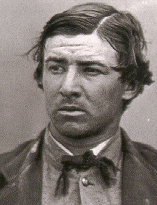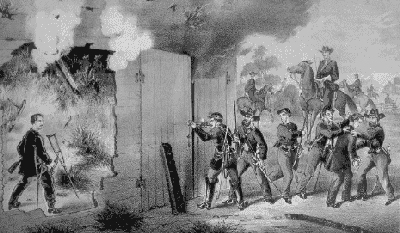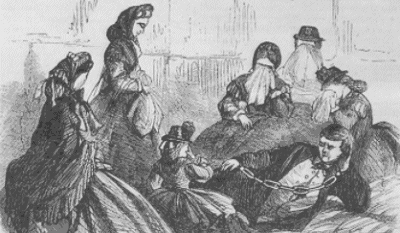
1842-1865
Biographic Sketch of David Herold
David Herold's Role in the Conspiracy
Images of David Herold


Biographic Sketch of David Herold
David Herold was the sixth of eleven children born to the chief clerk at the Navy Store at the Washington Navy Yard. Herold met John Surratt while attending Charlotte Hall Academy, and through Surratt in 1863 Herold was introduced to John Wilkes Booth.
David Herold's Role in the Conspiracy
David Herold accompanied Lewis Powell to the home of Secretary of State William Seward on the night of April 14. While Powell entered the Seward home and made his knife attack on the Secretary, Herold waited outside with his horse.
(According to co-conspirator George Atzerodt, Booth had chosen Herold to assassinate Vice President Andrew Johnson at the Kirkwood Hotel. It is believed to be Herold's gun, bowie knife, and map of Virginia that were discovered by investigators in a room at the Kirkwood rented by Atzerodt. Whether Atzerodt's story is entirely accurate and why, if so, Herold did not carry out his attack on Johnson is unknown.)
After the attack on Seward, Herold crossed the Navy Yard Bridge and made his way into Maryland, where he met up with the injured John Wilkes Booth. Herold and Booth's escape route took them to the home of John Lloyd in Surrattsville, where they picked up carbines, and then to the home of Dr. Samuel Mudd, where Booth found treatment for his broken leg. A pursuing party of soldiers finally caught up with Herold and Booth at Garrett's farm in northern Virginia in the early morning of April 26. Faced with the prospect of being shot or dying in a burning barn, Herold surrendered.
David Herold on Trial
There was never any serious question about the outcome of the military trial with respect to Herold. Apprehended with the President's assassin and the apparent mastermind of the conspiracy to destabilize the federal government, Herold would be hanged. To make matters worse, Herold had bragged about the crime, telling Willie Jett as he crossed the Rappahannock, "We are the assassinators of the President."
Herold's attorney, Frederick Stone, placed whatever slender hopes for saving Herold's life he had convincing the Military Commission that Herold was a simple man, barely an adult, who fell under the spell of the sophisticated John Wilkes Booth. Stone presented testimony of friends who described him as "easily persuaded and led" and "boyish in every respect." William Keilotz, for example, said, "I consider his character very boyish. I see him often in the company of boys; he is very fond of their company, and he never associates with men." James Nokes called Herold "a light and trifling boy" who was "easily influenced." Nokes added that he had "never heard him enter into any argument on any subject in the world." Dr. Charles Davis agreed, calling Herold "a boy; he is trifling, and always has been." Davis testified that "nature had not endowed him with as much intellect as the generality of people possess." Finally, Dr. Samuel McKim said of Herold: "In mind, I consider him about eleven years of age."
Stone argued to the Commission that Herold "was only wax in the hands of a man like Booth." Booth, he said, "exercised unlimited control over this miserable boy, body and soul, he found him unfit for the deeds of blood and violence; he was cowardly; he was too weak and trifling; but he still could be made useful." Stone found significance in one of Booth's final statements, made about Herold: "I declare, before my Maker, that this man is innocent."
The Commission remained unpersuaded. Herold was sentenced to death. He died with three fellow conspirators on the gallows in Washington on July 7, 1865.
